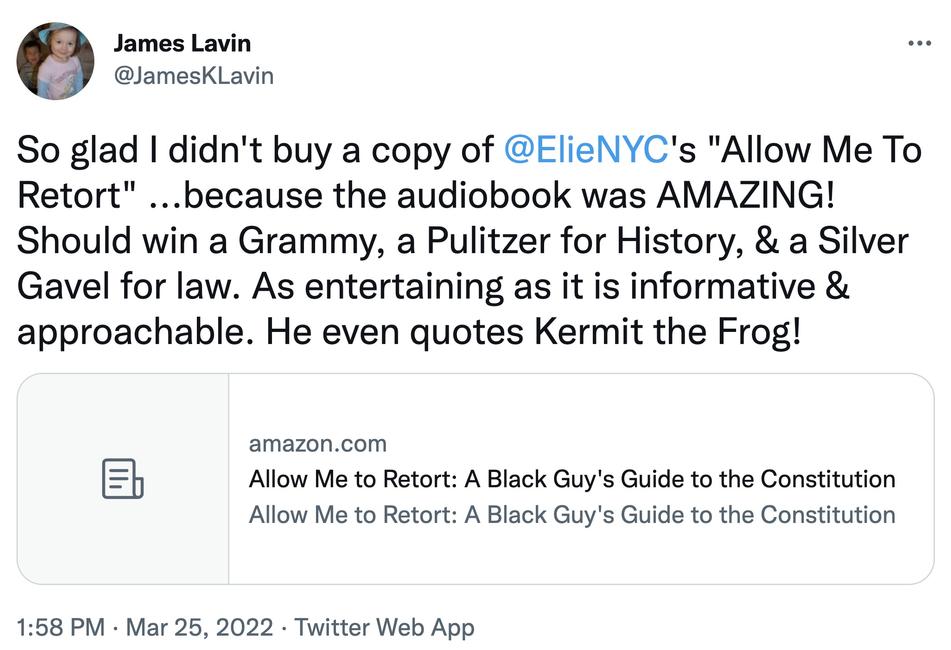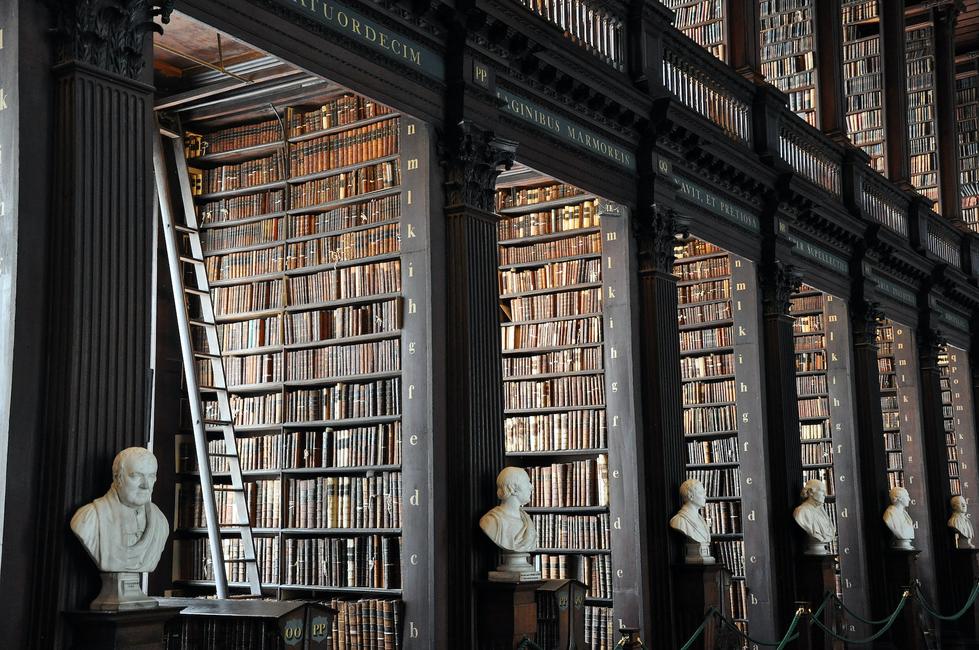“Immature poets imitate; mature poets steal. …The good poet welds his theft into a whole of feeling which is unique, utterly different from that from which it was torn… A good poet will usually borrow from authors remote in time, or alien in language, or diverse in interest.”
Most ideas you’ve ever thought, someone else thought them before you. And – as I learned to my dismay as a graduate student searching for prior literature on countless exciting “new” theories I thought up – most of the best ideas you’ll ever have, someone will have already beaten you to them.
Given that most of what we learn in life others have already learned, why not skip “learning from our mistakes” straight to learning from others’ mistakes and successes?
I love books because they let me absorb others’ wisdom. Libraries and bookstores are repositories of wisdom gifted to us by other human beings who took the time and made the effort to discover and document their best ideas. Reading great books fills my brain with amazing thoughts, many of which I would likely never have enjoyed but for stealing wisdom from others. The great Carl Sagan said this beautifully:
What an astonishing thing a book is. It’s a flat object made from a tree with flexible parts on which are imprinted lots of funny dark squiggles. But one glance at it and you’re inside the mind of another person, maybe somebody dead for thousands of years. Across the millennia, an author is speaking clearly and silently inside your head, directly to you. Writing is perhaps the greatest of human inventions, binding together people who never knew each other, citizens of distant epochs. Books break the shackles of time. A book is proof that humans are capable of working magic.
Decades ago – possibly on one of my bike rides to return a bookbag full of books and fill it up again at my town library – I accumulated ideas for a sci-fi novel, one of which was a computer that could read books at incredible speed and learn from all recorded human knowledge. Though I didn’t know it, this idea was hardly innovative either. Robert A. Heinlein’s The Moon Is a Harsh Mistress published the idea in 1966, three years before I was born. (It’s a wonderful novel I highly recommend.) In it, the sentient computer “HOLMES IV (“High-Optional, Logical, Multi-Evaluating Supervisor, Mark IV”)” consumes massive volumes of text and audio and uses its knowledge to efficiently manage the human colony on the moon (and secretly assist a rebellion).
Fast-forward sixty years, and we have ChatGPT, an algorithm trained on massive quantities of human knowledge – some of it even in the public domain – responds to prompts with seemingly authoritative responses, as evidenced by its outscoring 90% of human bar exam test-takers (or “just” 68%).
Unfortunately, ChatGPT’s authoritative and seemingly omniscient tone is backed up with completely fabricated “facts”:
Mata’s lawyer, Steven A. Schwartz, submitted a brief based on research done by ChatGPT…
…the AI invented court cases that didn’t exist, and asserted that they were real.
The fabrications were revealed when Avianca’s lawyers approached the case’s judge, Kevin Castel of the Southern District of New York, saying they couldn’t locate the cases cited in Mata’s lawyers’ brief in legal databases.
The made-up decisions included cases titled Martinez v. Delta Air Lines, Zicherman v. Korean Air Lines and Varghese v. China Southern Airlines.
– Megan Cerullo, “A lawyer used ChatGPT to prepare a court filing. It went horribly awry,” CBS News
ChatGPT’s impressive flash and style coupled with its disregard for substance and facts makes it an eager or desperate bullshit artist. (That I’m anthropomorphizing and attempting to attribute emotions and motives to a computer algorithm illustrates how far they have advanced!) ChatGPT is the college student who partied all semester, then sat for its final exams. ChatGPT’s willingness to manufacture “facts” threatens to flood the Internet with hard-to-detect lies.
Fast forward a few more decades, and our AI overlords may have exterminated us to stop us from destroying this incredible planet… or benevolently keep us, their intellectually inferior creators, on as pets.
Though our future is unknowable, the attraction of absorbing megadoses of high-quality ideas via books is obvious. Learning is fun. And learning is valuable.
In recent years I haven’t “read” as many books as I used to, but I now LISTEN to more books than ever before. For the past few years, I’ve posted all books I’ve read. I research each book before investing my time and money in it, and I don’t finish every book I start, so you might find value in my list of completed books.
I was driven to audiobooks in late 2019, after suffering a detached retina. The very successful vitrectomy that saved my eye – thank you again, Dr. Peter Weseley!!! – induced a cataract that grew progressively worse until I fixed that with successful cataract surgery! For two years, between those surgeries, I couldn’t focus both eyes at any distance and compensated by switching from dead-tree books to audiobooks.
Constraints, setbacks, and disappointments can unlock wonderfully unexpected benefits, like the incredible musicianship of some blind people. Conversely, victories and wealth can blind us to opportunities or lead us to gluttony and premature death. The contingent nature of the goodness or badness of events in our lives is why Stoic philosophy stresses that most events are, intrinsically, neither good nor bad. Whether something is good or bad for us is contingent on the totality of our life-long circumstances and is often unknowable by us in the moment.
My happy accidental discovery of the joys of “reading” audiobooks has now blossomed into a habit… okay, an addiction. The only physical books I still read the old-fashioned way are inherently visual books, like technical books with code examples. I now do 95% of my text-based “reading” via audiobooks while accomplishing other tasks.
I borrow audiobooks from our town library – which has both Libby and Hoopla – and buy a ton through Audible (always during their discounted sales). (Other options also exist, like LibriVox.) I also enjoy listening to podcasts. I tend to listen at 3X speed while doing laundry, washing dishes, walking, showering, making coffee, driving, etc. I love using all my “dead time” to fill my brain with wonderful ideas from authors who have condensed their best thoughts into an easily consumed format.
In retirement, I expect I’ll enjoy reading dead trees again. But I read to learn, and audiobooks are easier to fit into my daily life and easier to consume. I enjoy audiobooks and podcasts so much that they help motivate me to get out the door (or onto the treadmill) to exercise more. I walk/jog more thanks to audiobooks, and I listen to more audiobooks because they’re enjoyable while exercising and doing chores.
I love sitting with a good book as much as the next bookworm, but if you’re a dead tree snob, I encourage you to just TRY one audiobook. It’s not either/or. You can read physical books while occasionally listening to one. I find audiobooks (and podcasts) encourage me to walk more, and walking encourages me to “read” more. And I “read” so much more now by “reading” while doing laundry, etc.
I’d also encouage you to branch out in your reading taste. If you consume mostly non-fiction, try an occasional fiction book. If you read nothing by fiction, try an occasional non-fiction book. I’m generally 95% non-fiction. But good fiction can bend your mind in exciting new ways. I really like Vonnegut, for example. “Project Hail Mary” by Andy Weir, who also wrote the book that became the movie “The Martian” is excellent. I listened to the audiobook, which was outstanding. I was confused for the first 10 minutes, but there’s a very good reason for it. It’s a beautiful, touching, mind-bending space mystery with plenty of science & engineering.
As a non-fiction recommendation, if you haven’t read Elie Mystal (https://twitter.com/ElieNYC)'s “Allow Me To Retort,” please run out and get it. I especially strongly recommend the audiobook, which the author narrates brilliantly. His presentation is super entertaining and engaging. Better than those same words as text on a page, as I Tweeted on the pre-Musk Twitter:

Two especially powerful books I read recently are Simu Liu’s We Were Dreamers: An Immigrant Superhero Origin Story and Kareem Abdul-Jabbar’s Coach Wooden and Me: Our 50-Year Friendship on and off the Court.
There are 1,000 times as many great non-fiction books out there as I have time to read, despite “reading” many at 3x speed. So I often feel I can’t “waste” precious time reading fiction or non-fiction on topics of no obvious immediate relevance to my life. But I’ve also learned that many of the most valuable books I’ve read have been on topics I “wasn’t interested in” and would never have sought out.
Some of the most informative books are those I’ve stumbled onto only because they were in my library’s audiobook collection or offered on Audible during a 2-for-1 sale or daily special. When I stumble onto free/discount books that are highly regarded and authored by experts in their fields, I’m generally not initially excited to read them, but some of them wind up being truly mind-opening in ways books on topics I sought out seldom are. When you’re ignorant about a topic, it often initially seems uninteresting, but as you learn more, you often discover your interest growing along with your knowledge. And on topics where your initial ignorance is vast, you grow more because you’re filling in your knowledge chasms, rather than incrementally filling in cracks in your knowledge on topics with which you’re familiar.
That’s a specific example of a general principle that we tend to mindlessly fall into repetitive behavioral loops that may be sub-optimal. Only by breaking those patterns can we sometimes discover better behaviors. Consequently, many experts advise that we intentionally seek out novelty and break from our routines because when we do, we may serendipitously discover new, superior behaviors. My detached retina and subsequent cataract forced me into audiobooks, which I now find superior to physical books for non-technical material because I can absorb it quickly while doing chores/exercise/etc. I find an occasional novel (esp. sci-fi) similarly refreshing.
I hope this post has inspired you to read a book, visit your library, try an audiobook, listen to a podcast, and broaden your reading horizon to explore new genres and topics.
Books are magical. Individuals of no other species are capable of transmiting knowledge, wisdom, and expertise to others as humans can through books. Humanity has discovered and invented and created so much wondrous knowledge. I could spend many lifetimes learning from the accumulated knowledge available in books. I will cram as many amazing books into my one lifetime as I can… and I encourage you to do so too!
(My thanks to Alex Block for his photo on Unsplash)
